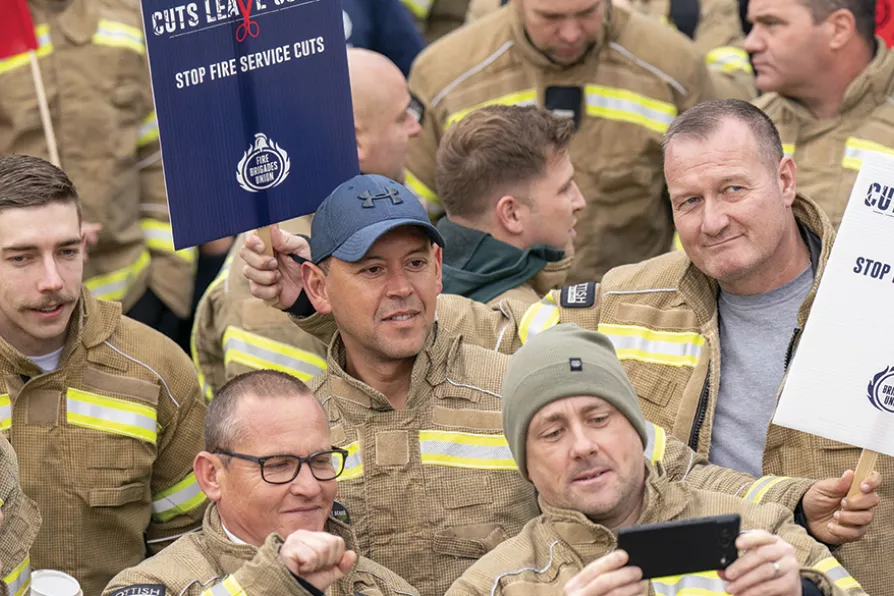SOLOMON HUGHES reveals how six MPs enjoyed £400-£600 hospitality at Ditchley Park for Google’s ‘AI parliamentary scheme’ — supposedly to develop ‘effective scrutiny’ of artificial intelligence, but actually funded by the increasingly unsavoury tech giant itself

 REBELS WITH A CAUSE: Firefighters at the Cuts Leave Scars rally outside the Scottish Parliament in Edinburgh last October
REBELS WITH A CAUSE: Firefighters at the Cuts Leave Scars rally outside the Scottish Parliament in Edinburgh last October
AT the time of writing, it is now 15 months since five peer-reviewed reports into firefighter cancers and diseases, commissioned by the Fire Brigades Union (FBU) and independently carried out by the University of Central Lancashire, were published.
The shocking results were that compared to the general public, firefighters’ mortality rate from all cancers is 1.6 times higher, deaths from heart attacks are five times higher and strokes are three times higher.
Firefighters are developing cancer at higher rates and younger ages. Contaminants are causing higher rates of mental health issues, with firefighters three times more likely to suffer from depression, and twice as likely to suffer from anxiety.
These reports, alongside international evidence, led the International Agency for Research on Cancer, the cancer agency of the World Health Organisation, to classify occupational exposure as a firefighter as carcinogenic to humans, placing firefighting within group one, the highest level of certainty that as an occupation, firefighting causes cancer.
One would have expected governments and fire and rescue services to immediately take steps to monitor, mitigate and control the risks and exposure rates of firefighters. The FBU has made repeated calls for firefighters to have career-long health monitoring for cancers and other diseases highlighted in the studies and for this to continue in retirement. To date, these calls have been at best ignored, in some instances, shunned.
It is a mark of shame that to date, no government in Britain has come forward with proposals or funding to provide annual health monitoring, leaving it to individual fire and rescue services to try and address. To their credit, some employers, including the Scottish Fire and Rescue Service have, to varying degrees, adopted the best practice guidelines produced by the FBU through our “decon” campaign and ongoing research. But progress is grindingly slow, and the required mitigations come at a significant cost.
Reducing the exposure time of a firefighter at an incident requires them to be replaced or relieved by another firefighter. A decade of cuts has seen over 11,000 firefighters slashed from Britain’s fire and rescue services.
The result; firefighters are left on incident grounds for protracted periods in contaminated fire kits, exposed to toxic and carcinogenic smoke, continuing to absorb these through their lungs, skin and mucus membranes — continuing to be put at greater risk of cancer, heart attack, stroke and negative impacts on mental health.
Simple mitigations such as the provision of additional PPE to allow increased laundering of contaminated fire kits come at a significant cost to fire and rescue services with further additional costs for increased laundering all having to be funded from already stretched existing budgets.
In theory, health monitoring, which could catch firefighter cancers early, should be a priority and relatively simple to implement. However, fire and rescue services generally don’t have in-house staff qualified to take blood, so this would require it to be outsourced.
Clinically compliant and secure transportation and lab testing of samples would again require outsourcing before reporting back to the individual firefighter.
Support for firefighters receiving a cancer or other life or career-altering diagnoses would be required. It is unlikely that fire and rescue services have qualified professionals to support their staff in such circumstances so again this would require costly outsourcing.
Or should this additional burden be passed to an already overstretched NHS?
With 49 different fire service employers, operating under differing legislative, governance and administrative arrangements, barriers quickly evolve, adding layers of complication, and layers of cost that current fire and rescue services and NHS budgets are unable to support.
And what of those firefighters who do receive a life-changing or terminal diagnosis, having given their health in pursuit of protecting others — surely the state will provide a safety net for them and their families? Currently, no government in any part of Britain seems to want to grasp this nettle.
The outdated industrial injuries advisory council (UK IIAC), which advises the British government on what should be recognised as industrial injuries under legislation and related benefits, do not recognise occupational exposure as a firefighter as group one carcinogenic to humans.
Firefighters exposed at work, contracting cancer or other related diseases through their work, are left facing ill health in retirement and the very real likelihood of dying avoidable deaths younger — and from treatable diseases.
On April 18, just one week before International Workers Memorial Day, the Scottish government, working alongside Scottish Tory MSPs, voted down a Bill that would have created a Scottish employment injuries advisory council and modernised the outdated UK IIAC ahead of responsibility for the Industrial Injuries Disablement Benefit being devolved to Scotland in 2026.
So this week, when they stand in the chamber and on platforms to commemorate workers, like their Westminster counterparts, they do so in the knowledge that they have chosen to continue to ignore the now irrefutable fact that firefighters are dying from work-related cancers and diseases. Through their inaction, they continue to be complicit in allowing this travesty to continue.
Colin Brown is an FBU Scotland executive council member.














